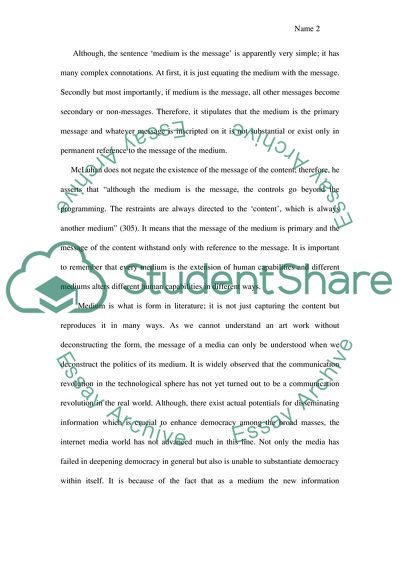Cite this document
(The Medium Is the Message - What Marshall McLuhan Meant By This Statem Essay - 1, n.d.)
The Medium Is the Message - What Marshall McLuhan Meant By This Statem Essay - 1. https://studentshare.org/information-technology/1751392-the-medium-is-the-message-explore-what-marshall-mcluhan-meant-by-this-statement-tie-it-to-ways-the-internet-and-telecommunications-may-also-be-changing-us
The Medium Is the Message - What Marshall McLuhan Meant By This Statem Essay - 1. https://studentshare.org/information-technology/1751392-the-medium-is-the-message-explore-what-marshall-mcluhan-meant-by-this-statement-tie-it-to-ways-the-internet-and-telecommunications-may-also-be-changing-us
(The Medium Is the Message - What Marshall McLuhan Meant By This Statem Essay - 1)
The Medium Is the Message - What Marshall McLuhan Meant By This Statem Essay - 1. https://studentshare.org/information-technology/1751392-the-medium-is-the-message-explore-what-marshall-mcluhan-meant-by-this-statement-tie-it-to-ways-the-internet-and-telecommunications-may-also-be-changing-us.
The Medium Is the Message - What Marshall McLuhan Meant By This Statem Essay - 1. https://studentshare.org/information-technology/1751392-the-medium-is-the-message-explore-what-marshall-mcluhan-meant-by-this-statement-tie-it-to-ways-the-internet-and-telecommunications-may-also-be-changing-us.
“The Medium Is the Message - What Marshall McLuhan Meant By This Statem Essay - 1”. https://studentshare.org/information-technology/1751392-the-medium-is-the-message-explore-what-marshall-mcluhan-meant-by-this-statement-tie-it-to-ways-the-internet-and-telecommunications-may-also-be-changing-us.


